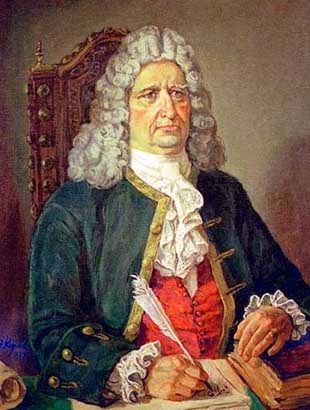Top Qs
Timeline
Chat
Perspective
Gerhard Friedrich Müller
Russian-German historian and ethnologist (1705–1783) From Wikipedia, the free encyclopedia
Remove ads
Gerhard Friedrich Müller (Russian: Фёдор Ива́нович Ми́ллер, romanized: Fyodor Ivanovich Miller; 29 October 1705 – 22 October [O.S. 11 October] 1783) was a Russian-German historian and pioneer ethnologist.
You can help expand this article with text translated from the corresponding article in Russian. (August 2024) Click [show] for important translation instructions.
|
This article includes a list of references, related reading, or external links, but its sources remain unclear because it lacks inline citations. (July 2013) |

Remove ads
Early life
Müller was born in Herford and educated at Leipzig. In 1725, he was invited to St. Petersburg to co-found the Imperial Academy of Sciences.
Career
Summarize
Perspective
Müller participated in the second Kamchatka expedition, which reported on life and nature of the further (eastern) side of the Ural mountain range. From 1733 until 1743, nineteen scientists and artists traveled through Siberia to study people, cultures and collected data for the creation of maps. Müller, who described and categorized clothing, religions and rituals of the Siberian ethnic groups, is considered to be the father of ethnography.[1]
On his return from Siberia, he became historiographer to the Russian Empire. He was one of the first historians to bring out a general account of Russian history based on an extensive examination of the documentary sources.[2] His accentuation of the role of Scandinavians and Germans in the history of that country – a germ of the so-called Normanist theory – earned him enmity of Mikhail Lomonosov, who had previously supported his work, and dented his Russian career.
In the early 1760s, he rediscovered the 14th–15th century List of Russian Cities, Near and Far, after which his colleague August Ludwig von Schlözer published in Russian in 1816.[3]
In 1766, after many attacks by his colleagues, Müller was appointed keeper of the national archives. He drew up for the government a collection of its treatises.
Remove ads
Later life
In 1761, Müller was elected a foreign member of the Royal Swedish Academy of Sciences. He died, aged 77, in Moscow.
See also
References
Bibliography
Further reading
External links
Wikiwand - on
Seamless Wikipedia browsing. On steroids.
Remove ads
